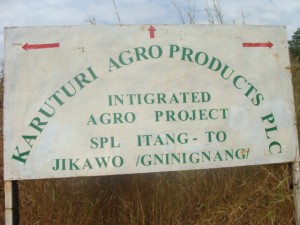Anyuak Media | 24 November 2010
By Dr. Magn Nyang
Recently, after 18 years of absenteeism, I travelled to Ethiopia and while I was there, I went to visit my birth village of Pinyudo. Pinyudo is a remote village located at about 105 Kilo Meters (66 miles) from Gambella town. Due to poor conditions of the road, it took me 2 hours to get there by a car. The whole 2 hours journey was in the middle of huge farms. When I left my village some 29 years ago, the farms between the Village of Pinyudo and Gambella town were owned by Anyuaks (Anywaa), my own people. In fact, before what we call Ethiopia today became a state and forced itself upon the Anyuaks, the Anyuak farmers were already there farming their God given land. Now, when I travelled to my birth village from Gambella town, the farms between were owned by several global food companies including Karuturi Global of India and the Saudi Star own by Sheikh Mohammed Hussein Ali Al Amoudi. These companies acquired 99 years lease from the Ethiopian government.
What the government did not know is that one cannot eradicate poverty by leasing farmland to huge global food companies. These global food companies are arguably the greatest generators of poverty, and consequently social and political instability in the world today. In the past fifty years, prices for agricultural commodity have fallen sharply, making cheap food readily accessible for rich countries and simultaneously making living incomes increasingly inaccessible in poor food-producing countries.
In 2002, Oxfam reported that the fallen prices for coffee have created crisis for more than 25 million coffee producers around the world including Ethiopians. Today, Ethiopian farmers sell their coffee beans for much less than they cost to produce. This exemplifies the harsh reality of global food markets for more than a billion people in agriculture worldwide. Leasing farming land to these multinational food companies (Karuturi Global, Saudi Star, and so on ---) by Ethiopian government will not make lives any better for indigenous people and for millions of Ethiopian farmers. These multinational food companies have basic business model that is driven by investing in technology to boost productivity—resulting in continually declining prices and continually increasing production. Unfortunately, this business model, though it takes little heed of social and ecological realities, goes unquestioned by unsophisticated leadership in Addis Ababa.
According to the economic theory of commodity industries, rising production and falling prices continue until profits are so low that investment capital moves elsewhere. The Karuturi Global, the Saudi Star, and the likes are bound to move somewhere else, once they deplete the long-term fertility of the soil. However, poor farmers do not have this option. In fact, poor farmers typically keep trying to expand production even when costs exceed prices in desperate attempts to maintain their incomes and stay on their land.
I was puzzled by a statement given by Meles Zenawi when asked what was the benefit for indigenous people of Gambella from the leased farmland produce. Meles stated that these multinational food companies are not here for charity reasons, they are here for profit and as long as the federal government gets the hard currency from these companies, they are free to sell their produce wherever they want. This is a very careless statement from a leader of a country whose job was to look out for the best interest of his people. Ethiopians do not need multinational food companies to improve their livelihood. They do not need to be exploited by these companies. What they need is for their government to teach and subsidize the farmers and transform them from subsistence to mechanized formers, not to invite multinational food companies whose basic model is driven by profit. I call on all Ethiopians to voice their opposition to this madness, farmland giveaway, by the current government. Dr. Magn Nyang can be reached by writing to: [email protected]











